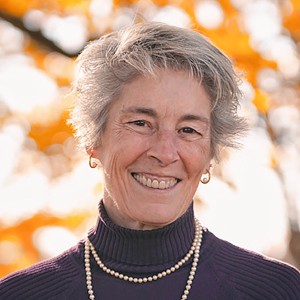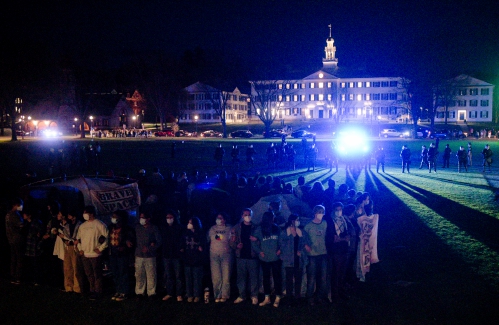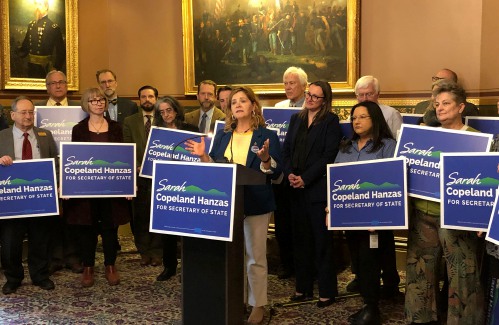
Latest News
 Colby-Sawyer names interim president
Colby-Sawyer names interim president
 Group launches fundraiser for Lyme covered bridge
Group launches fundraiser for Lyme covered bridge

Dartmouth moves swiftly to stymie demonstration, leads to 90 arrests
HANOVER — Dartmouth College administrators acted swiftly on Wednesday night when faced with a protest encampment similar to those established on campuses around the country amid unrest over the Israel-Hamas war.At some colleges, demonstrations have...

Sarah Copeland Hanzas launches bid for second term as secretary of state
Vermont Secretary of State Sarah Copeland Hanzas wants another two years in office.The Bradford Democrat announced her bid for reelection at a press conference Wednesday in the Statehouse. She was flanked by dozens of legislators who called her a...
Most Read
 Dartmouth moves swiftly to stymie demonstration, leads to 90 arrests
Dartmouth moves swiftly to stymie demonstration, leads to 90 arrests
 Dartmouth graduate student-workers go on strike
Dartmouth graduate student-workers go on strike
 At Dartmouth, hundreds protest ongoing war in Gaza and express support for academic freedom
At Dartmouth, hundreds protest ongoing war in Gaza and express support for academic freedom
 Art Notes: City Center Ballet celebrates 25 years
Art Notes: City Center Ballet celebrates 25 years
Editors Picks
 Herd departs Hartford’s last remaining dairy farm
Herd departs Hartford’s last remaining dairy farm
 A Life: Richard Fabrizio ‘was not getting rich but was doing something that made him happy’
A Life: Richard Fabrizio ‘was not getting rich but was doing something that made him happy’
 Kenyon: What makes Dartmouth different?
Kenyon: What makes Dartmouth different?
 Publisher’s note: Valley News launches updated online app
Publisher’s note: Valley News launches updated online app
Sports

Oxbow softball at dynastic, dominant best
BRADFORD, Vt. — The exuberant shout emanated from the home dugout Tuesday as Oxbow High entertained Thetford in a VPA Division III softball clash.“Hit it louder!” The hosts certainly did so, orchestrating a virtual cacophony of bat smacks and hand...
 Local Roundup: Hanover, Lebanon girls tennis teams are undefeated
Local Roundup: Hanover, Lebanon girls tennis teams are undefeated
 Local Roundup: Lebanon wins big over Bow in boys tennis
Local Roundup: Lebanon wins big over Bow in boys tennis
 New Mascoma equestrian team has early success
New Mascoma equestrian team has early success
Opinion

Editorial: Chris Sununu’s moral vacuum
New Hampshire Gov. Chris Sununu’s conversion from “Never Trump” to “Ever Trump” occurred not on the road to Damascus but on the Republican Party’s road to perdition.On ABC News last Sunday, Sununu affirmed his intention to support Donald Trump for...
 Editorial: Gambling tarnishes America’s sporting life
Editorial: Gambling tarnishes America’s sporting life
 By the Way: A white nationalist’s many mistruths
By the Way: A white nationalist’s many mistruths
 Column: The age-old question of what to read
Column: The age-old question of what to read
 Editorial: Transparency wins in NH Supreme Court ruling
Editorial: Transparency wins in NH Supreme Court ruling

Photos

Spring cleanup in Lebanon
 Drawn to dragons
Drawn to dragons
 Clear and free in Hartford
Clear and free in Hartford
 Ramping up their foraging
Ramping up their foraging
 Roadside assist in Bethel
Roadside assist in Bethel
Arts & Life

Bald eagles are back, but great blue herons paid the price
After years of absence, the most patriotic bird in the sky returned to Vermont — but it might’ve come at another’s expense.Vermont finally took the bald eagle off of its endangered species list in 2022 following years of reintroduction efforts...
 JAG Productions announces closure, citing ‘crisis facing the arts’
JAG Productions announces closure, citing ‘crisis facing the arts’
 How a hurricane and a cardinal launched a UVM professor on a new career path
How a hurricane and a cardinal launched a UVM professor on a new career path
Obituaries
 Robert H. Mattson
Robert H. Mattson
Hartford, VT - Robert H. Mattson, age 76, passed Wednesday, February 28, 2024. A graveside committal service will be held at 1pm on Friday, May 10th, 2024 in the Ascutney Cemetery in Windsor, VT. Knight Funeral Home has been entrust... remainder of obit for Robert H. Mattson
 Mary Olive Tracy
Mary Olive Tracy
Windsor, VT - Mary Olive (Sulham) Tracy, 99, died Saturday, April 27, 2024, at the Stoughton House in Windsor, VT. She was born June 11, 1924, in Pittsfield, VT to Franklin Sulham and Mary Wescott. Olive grew up in Pittsfield, leaving ... remainder of obit for Mary Olive Tracy
 Malcolm L. Stevens
Malcolm L. Stevens
Lebanon, NH - Malcolm L. Stevens, age 93, passed Wednesday, April 24, 2024. Family and friends are invited to Malcolm's calling hour from 11 to 12 Monday May 6th 2024 at the Ricker Funeral Home in Lebanon. A memorial service will be... remainder of obit for Malcolm L. Stevens
 Corinne Moore
Corinne Moore
Fairlee, VT - Corinne (Godfrey) Moore, long time resident of Fairlee, VT, passed away peacefully on April 25th, 2024, after a short stay at the Jack Byrne Center in Lebanon, NH. Born in Post Mills, VT to Mary and Winston Godfrey, Corin... remainder of obit for Corinne Moore

 Sharon voters to decide $9.5 million school building bond
Sharon voters to decide $9.5 million school building bond

 Out & About: Newport art center’s exhibition celebrates homes of all varieties
Out & About: Newport art center’s exhibition celebrates homes of all varieties
